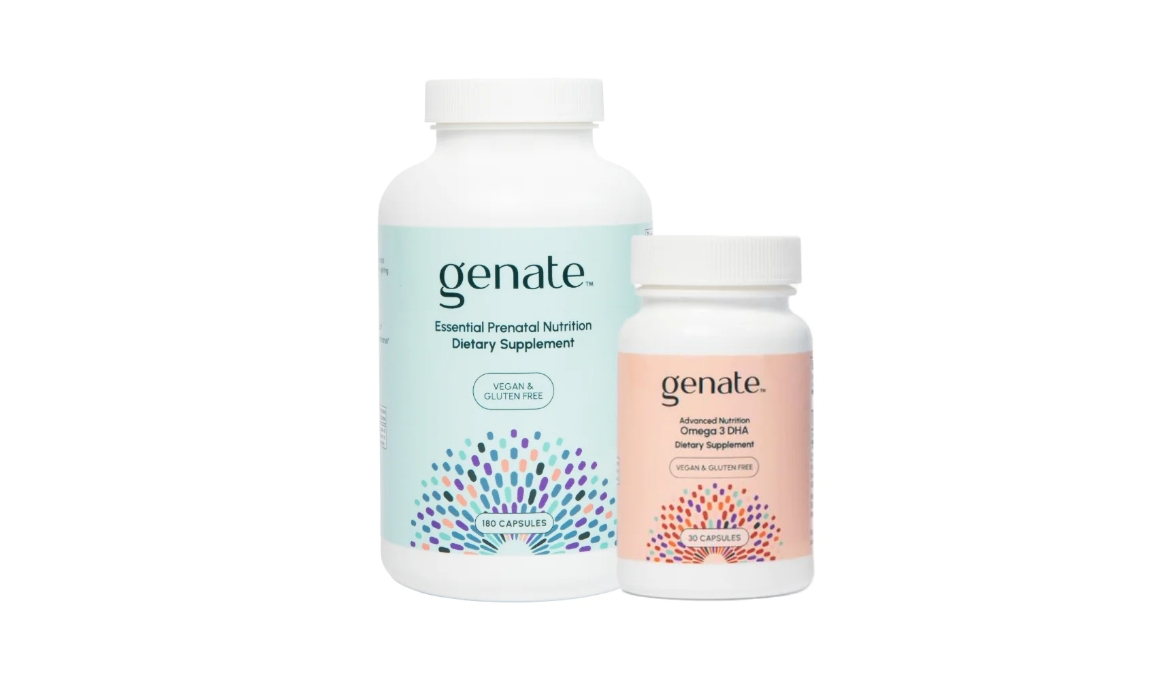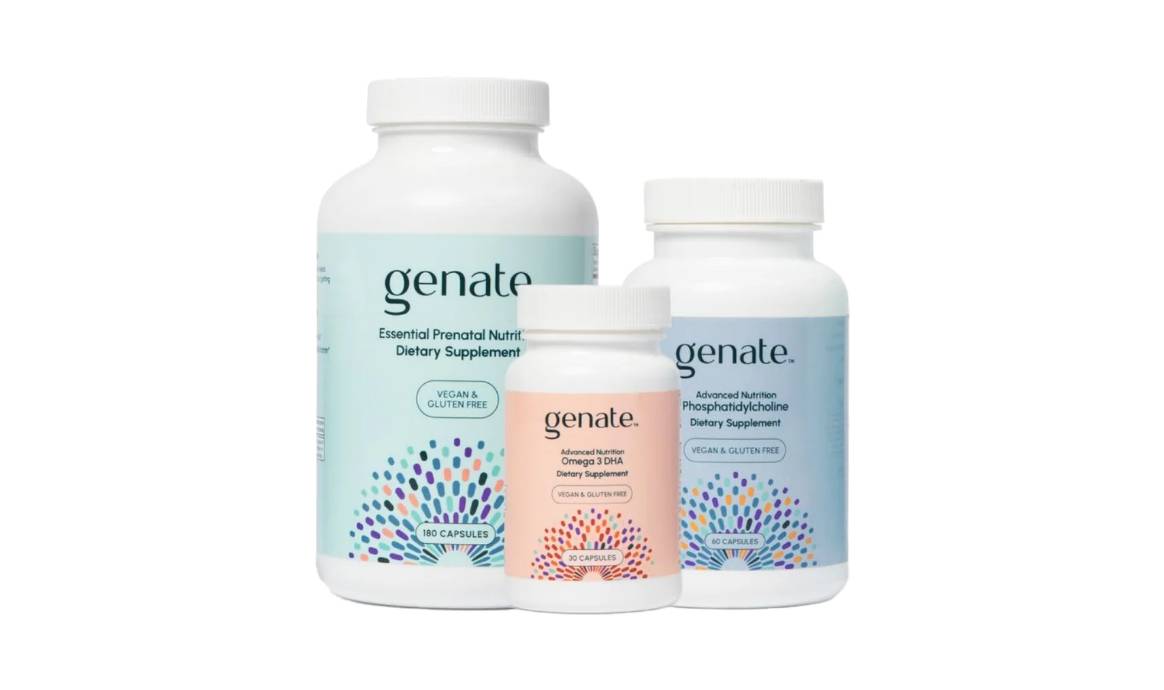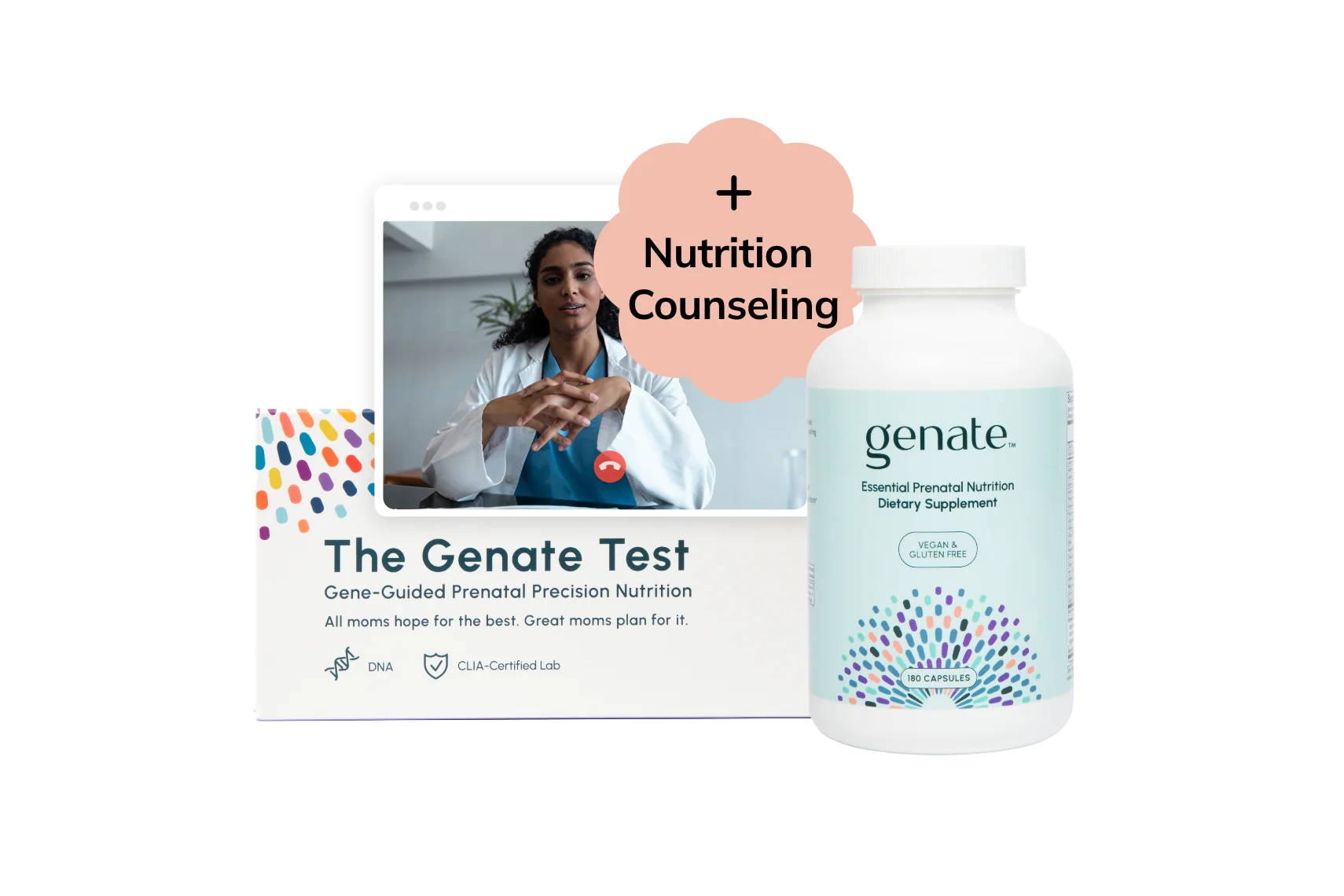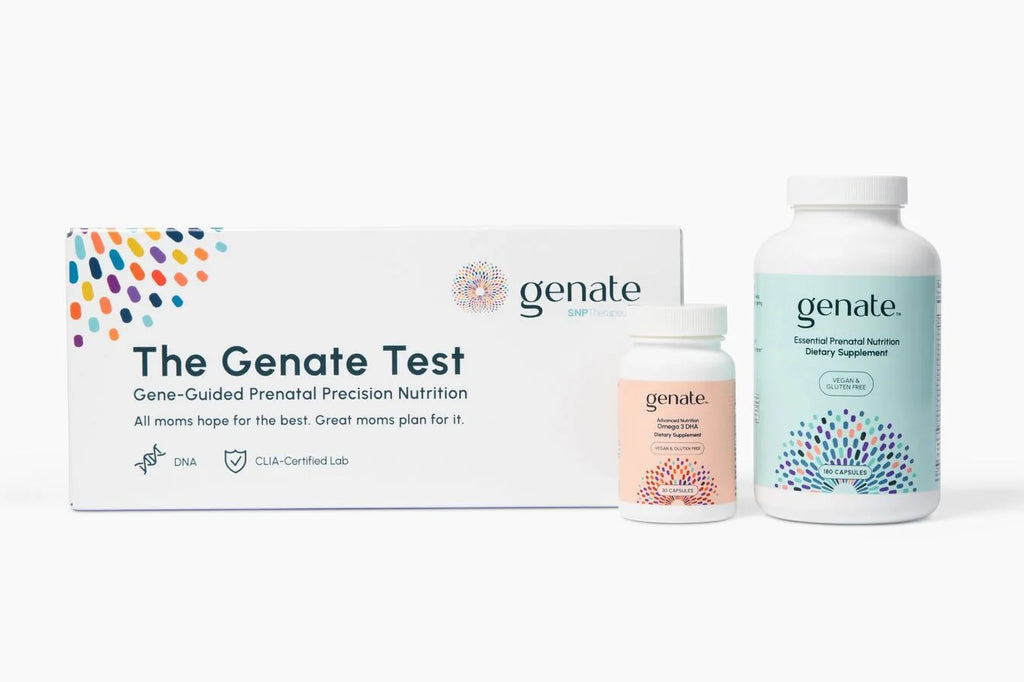Good nutrition is essential for every stage of your baby’s growth and development. But the efficiency with which your body metabolizes nutrients is partly determined by your genes, and common genetic variants can affect the metabolism of one-carbon nutrients that are critical for the development of your child’s brain and spinal cord. Genate Essential Prenatal Nutrition is a multivitamin formulated from academic research that provides women with a formulation optimized to support their baby’s cognitive development. It includes the one-carbon nutrients choline, betaine, methylfolate, and B vitamins that many women have trouble metabolizing and/or don’t get enough of in their diet.

MISCELLANEOUS
Noninvasive Prenatal Testing (NIPT): What You Need to Know
by Cara Everett, MS, RDN, LDN • September 25, 2023 • 6-8 minute read
What Is NIPT?
Noninvasive prenatal testing (NIPT) is a type of screening tool that analyzes fragments of fetal DNA circulating in the mother’s blood to determine the risk of chromosomal abnormalities in the fetus. It may also be called noninvasive prenatal screening (NIPS). 1
While NIPT can’t provide a diagnosis, it can indicate your baby’s risk of developing certain genetic conditions. If a genetic abnormality is suspected based on NIPT results, your healthcare provider may order diagnostic testing such as amniocentesis or chorionic villus sampling (CVS) for more information. 2
Discover the genetics that affect your baby's cognitive development
What Does NIPT Screen For?
While NIPT doesn’t test for all chromosomal conditions or birth disorders, most NIPT tests screen for:
- Trisomy 21 (Down syndrome)
- Trisomy 18 (Edwards syndrome)
- Trisomy 13 (Patau syndrome)
- A missing or extra X or Y chromosome
How Is NIPT Done?
By analyzing DNA in the mother’s blood, NIPT detects abnormalities in genetic fragments that could indicate an increased risk of one of the conditions above. Because both the baby’s and mother’s DNA are present in the blood sample, NIPT may also detect a genetic condition the mother didn’t know she had. It determines the baby’s gender as well, so if you don’t want to know that information, be sure to tell your healthcare provider ahead of time. 3
NIPT only requires a blood draw from the mother and poses no risk to the fetus. Because of this, NIPT is considered non-invasive, as opposed to invasive tests such as amniocentesis or chorionic villus sampling (CVS), which require a sample of the amniotic fluid or placental tissue, respectively, and carry a small risk of miscarriage.
Should I Have NIPT?
- An early ultrasound indicates your baby has an abnormality
- You already have a child with a chromosomal defect
- Another screening test shows there may be a problem with your baby
Should I Have NIPT?
What Does the Genate Test Measure?
1. Nutrition
2. DHA
3. Choline
4. Folate
Getting Proper Nutrients
Noninvasive Prenatal Testing in Closing
This article is not intended as medical advice to treat or diagnose any health condition but rather as educational health information for the general public. It should not be used as a substitute for individualized medical care from your healthcare provider.
Shop the Article
Save 23% today!
Genate Essential Prenatal Multivitamin + Advanced Omega-3 DHA Package
Bundle to increase savings and provide the foundational nutrients needed for optimal health and development.
From $72 per month
Save 23% today!
Comprehensive Prenatal Support Package
Genate Essential Prenatal Multivitamin + Advanced Omega-3 DHA + Phosphatidylcholine
Our most comprehensive bundle - you’ll receive our Essential Prenatal Multivitamin, Advanced Phosphatidylcholine, and Advanced Omega-3 DHA.
From $110 per month
Save 30% today!
Comprehensive Prenatal Nutrition Bundle
Buy the Genate Test and a nutrition counseling session with a Genate registered dietitian, and receive a 30-day supply of the Genate Essential Prenatal Multivitamin FREE. Purchase includes a 90-day prenatal multivitamin subscription at our best monthly price.
$309

About Cara Everett, MS, RDN, LDN
Cara is a registered dietitian nutritionist with a passion for helping people optimize their health with sustainable diet and lifestyle changes. She provides nutrition counseling to clients of all ages, with specialties in nutrigenetics, women's health, and chronic medical conditions.
Cara is also a health writer and editor with over 20 years of experience creating content for print and digital media outlets, nutrition and wellness blogs, and medical white papers. Her work has been featured on websites such as the National Council on Aging, Everyday Health, HelpGuide, MarketWatch, and Verywell. Cara's current writing covers women's nutrition and nutrigenetics in pregnancy and lactation.
As the lead dietitian for SNP Therapeutics, Cara shapes content strategy, medically reviews and edits articles, and provides gene-focused medical nutrition therapy for clients. She holds Bachelor of Science and Master of Science degrees in Nutrition from Texas A&M University and completed her dietetic internship at the University of Kentucky Hospital.
References
- What is noninvasive prenatal testing (NIPT), and what disorders can it screen for? MedlinePlus. https://medlineplus.gov/genetics/understanding/testing/nipt/ Published July 28, 2021. Accessed October 20, 2023.
- What noninvasive prenatal testing can (and can’t) tell you about your baby. UT Southwestern Medical Center. https://utswmed.org/medblog/prenatal-genetic-testing-nipt/ Published June 6, 2023. Accessed October 20, 2023.
- Harraway J. Non-invasive prenatal testing. Australian Family Physician. 2017;46(10):735-739. https://www.racgp.org.au/afp/2017/october/non-invasive-prenatal-testing/
- Zhiying Z, Fulgoni VL, Kris-Etherton PM, Mitsmeeser SH. Dietary intakes of EPA and DHA omega-3 fatty acids among US childbearing-age and pregnant women: an analysis of NHANES 2001–2014. Nutrients. 2018;10(4):416. https://doi.org/10.3390/nu10040416
- Choline. National Institutes of Health, Office of Dietary Supplements. https://ods.od.nih.gov/factsheets/Choline-HealthProfessional/ Updated June 2, 2022. Accessed October 20, 2023.
- Folate. National Institutes of Health, Office of Dietary Supplements. https://ods.od.nih.gov/factsheets/Folate-HealthProfessional/ Updated November 6, 2022. Accessed October 20, 2023.
Take the Genate Quiz
Take our Nutrition Quiz to learn more about your nutrition journey.
Read Our Latest Articles
Frequently Asked Questions
What are the benefits of my baby getting the proper nutrients?
What are one-carbon nutrients and fatty acids, and why are they important?
One-carbon nutrients and fatty acids are critical for brain and spinal cord development during pregnancy and through the first two years of life. Although all nutrients are important, the one-carbon nutrients choline, folate, betaine, and B vitamins, along with the omega-3 fat DHA, provide the building blocks for proper growth of your developing baby's brain. Research at Cornell and Harvard universities has shown cognitive benefits for children born to mothers who received increased levels of one-carbon nutrients during pregnancy, demonstrating that optimal nutrition during pregnancy can have lasting effects for your baby.
If I buy Genate nutrition supplements, do I still need to take the test?
Genetic testing is a personal choice, and only you can decide what’s best for you and your baby. But the Genate Test is a powerful tool for optimizing your nutrition status, as it identifies genetically-caused metabolic inefficiencies that may influence your body’ ability to make and use the nutrients critical for your baby’s cognitive development. If you have SNPs in any of the nutrient pathways tested, your Genate Report will provide personalized recommendations for optimizing your nutrition. Our registered dietitians can show you how to fill in the gaps with foods and supplementation, if needed, to make sure you’re getting the nutrition you and your baby need.








